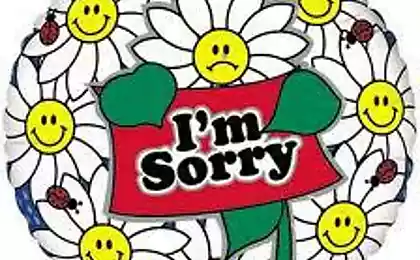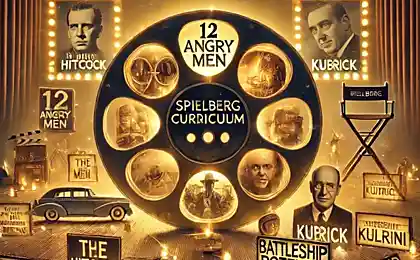Brian Chesky and Alfred Lin: What is the secret of the company's culture?

Ctenfordsky course CS183B: How to start a startup
Sam Altman and Dustin Moskowitz: How and why to create a startup? < Sam Altman: How to form a team and culture startup? Paul Graham: < a href = "http://habrahabr.ru/company/friifond/blog/242743/"> Illogical startup ; Adora Chyung: Product honesty and curve ; Growth hacking ; Peter Thiel: Competition - the lot of losers ; How to build a monopoly? Alex Schultz: Introduction to growth hacking [1 , 2 < / a>, 3 ]; Kevin Hale: The subtleties of working with user experience [ 1 , 2 ]; Tang, Williams and Kahn: Start small < / a>; How to work with the IT media? Andreessen, Conway and Conrad: How to attract investment ? [ 1 , 2 , 3 ] Brian Chesky and Alfred Lin : The secret to the company's culture? < br /> Alfred Lin (Alfred Lin)
So, here you have watched several presentations and learned how to create a startup. You have assembled a team, you know how to look your product, it is in demand, and your company grows. People love to your project, you know how to get their attention. You figured out how to create a single and unique company, and you have no competitors in the market, and that's worth something. And the market for which you want to go, still little more than the market for paper airplanes, so that all you have is good. What now?

We are here to prove that culture, in fact - is a very important component in the development of the company, are just as important as a team. I hope that after our conversation, you will learn what is culture. Why is it important? How to form the core values? As well as learn about the components that form the core values and culture, which form a good, effective team, and get some practical experience in this area.
What is culture? Anybody want to define culture? What did you say? Simple values in the team? Nice try. You gave this definition, because you have at hand a computer and access to the Internet? You can find a couple of definitions in Webster's dictionary, but we are with you at Stanford. It's kind of a trick question. In the study of computer science is never simple questions.
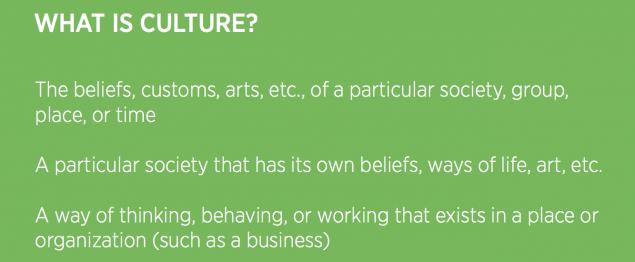
In asking this question, I had in mind: "What should a corporate culture?" The word culture we consume in different contexts: when we talk about society, about the groups, places or other things. Here we will talk about corporate culture.
Anybody can give a definition of corporate culture? We can take a bit of the previous definition and change it. Here's a hint how to define corporate culture: "_____ _____ and each team member to achieve _____ company».
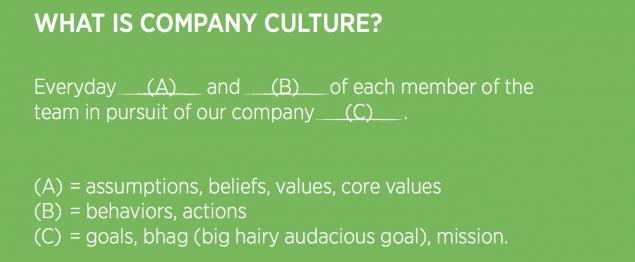
People fit into the gaps are completely different things. On the first pass is entered: assumptions, opinions, values, and, my favorite item, core values. At the site of the second pass often inside behavior and, my favorite word - action, how would you act? For what? Respond to this question seeks third pass. In order to achieve the objectives - somehow obscenities to pursue large and complex goal - a little better, but the best definition - is to achieve the company's mission.

Now we know the definition. So what do we do with it and why is it important? Here is a quote from Gandhi: "Your beliefs become your thoughts, your thoughts become your words, your words become your actions, your actions become the habits, habits become values, and your values become your destiny." If your company does not have a culture, you can not follow the path of your destination.

Culture is important because it lays the basic principles that you will be guided in making decisions. Culture - a way to get people to important values of the company, and provide some level of stability on which you can rely.
Culture also establishes a level of trust, and people begin to trust each other, but also it is able to show us what to do and, more importantly, what not to do. This approach will help you keep the "right" people. There are people who do not fit into your company, but if you have a good and strong culture, strong core values, you will be able to see who wants to stay in the company, and who - no. Once you know who is who, it will help you move forward faster.

You think I tell you some things murky, but here's something else again, this time more scientific. Here stocks from 1994 to 2013 - a stock index S & P500, Russell 3000, and even Fortune 100. Fortune 100 index creators include all companies that, in their opinion, it is best to work.
The growth rate of investment in this list is 11, 8%, which is two times more than the other two indexes. It can be concluded that the real strength of the company is ensured by good treatment of employees, trust in the team - that is by building a strong corporate culture.
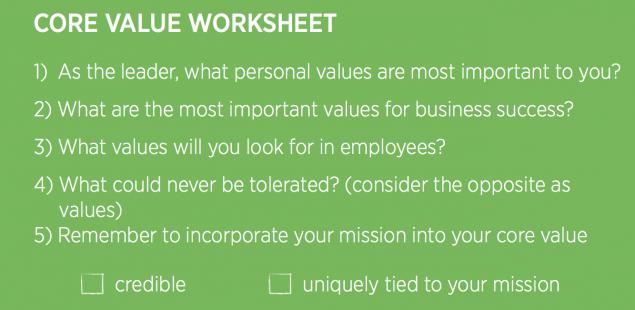
How did you form values and build company culture? People often ask me about it.
You should begin with the leader of the company and its founder, that is to ask yourself what qualities are most important to you? Which of these apply to business? Who are the people with whom you would like to work with? That they value? Blockquote> to answer these questions, you highlight the desired set of values. Think about what kind of people you would not want to work. What values do they have? Think about it the opposite, perhaps they fit your company. Finally, remember that your values should follow the company's mission, and if they do not follow it, then you're missing something, in the end, they must be credible and to be uniquely associated with your mission.
For example, to explicitly follow their mission, we Zappos focused on creating a culture of "connected" with the excellent customer service. The first value was to provide an excellent service. Our culture has been built very specific, first of all we would like to serve customers well and leaves a striking impression.
We [the company] had a little text in which it was explained that we lift under it. We want to support people to surprise them, to help our employees, our customers, our business partners and investors. But at the same time, however, in contrast to what has been said, we did not want to work with arrogant people, so one of our core values became shy. Here are two examples of how we have created a robust core values, clearly following our mission.
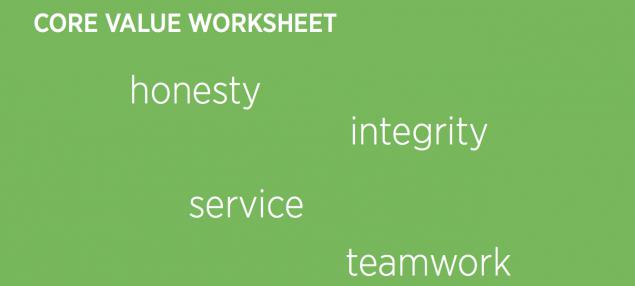
Upon reflection, you isolate your core values, there may be several, whether honesty, reliability, quality of service and teamwork. This can be a list that can start with three points and grow to ten, or even thirty.
When Zappos been through this, we asked all employees to highlight several core values, and they have written thirty-seven pieces. We reduced the number to ten. To do this, we took a long time for about a year. You may ask, why? Well, if you entered the list of the word "honesty", so I will at once and believe! Everyone wants to culture was honest, no one wants to be lied to every day.
Service, what do you mean by "service"? In this word a lot more hidden meaning than it seems. Everyone always says about teamwork, but it is not the teamwork that we see in the university competitions or baseball. How to make sense of what is teamwork? That will not be useful for the team?
Many of these things are related to communication and understanding, people with learning anything, and you can elaborate. In Zappos always had a lot of smart people. And when they were arguing with each other about who is right and who - no, it was irrational waste of time. We wanted to help people and prompted one another to do any better idea. The idea was that the company had advanced the idea, not the fact that someone from the staff proved that he was right. We wanted to promote the idea that in the first place is always the company, the second - Department - the third team, and only then - you. How can this be achieved?
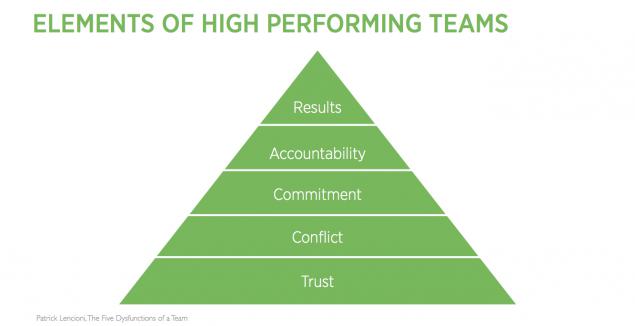
Let's delve into the question. There is another element of high-performance teams, who I love very much. This element - the pyramid, created by Patrick Lencioni, who has written an interesting book "Five teams vices».
The author tells about the reasons for differences in the team. Many teams fail because of lack of confidence, and even if there is one, then why is it necessary? If the trust is there, then there may be debate and discussion, in which the truth is born. If the dispute is not, it turns out that the blind leading the blind. How can you know for sure that we made the right decision if you have not discussed? In fact, people are not so much do not want to commit themselves, they are afraid to do it.
Let's assume that you have moved to another level: you are able to hit the ground running. What could go wrong? Typically, problems occur because people are not responsible for the actions they perform. If people are not responsible for their actions, then they do not get results. If you think of the company as a black box, the output of which are or financial gain, or a great product, or anything else as a result of the company, at the entrance to a black box with one of the most important parameters is the culture of the company. Some other practices, we will discuss a series of questions and answers, which is likely to result in a conversation about what you need to combine the company's mission and values, as I have already mentioned.
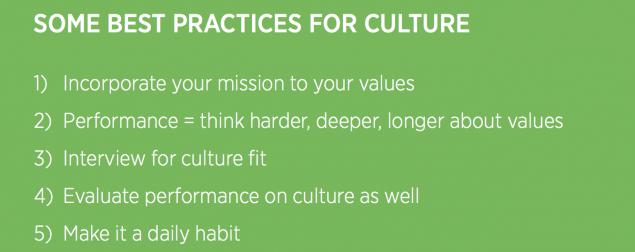
The work you need to seriously think about the values that have been chosen by you first. A lot of companies do not do one thing at a job they interviewed the applicant on the subject of technical skills, but did not check it against the culture of the company, do not assess whether he will believe in the idea of the company and follow its mission. Blockquote> I that this is absolutely the wrong approach. I believe that you can be the smartest engineer in the world, but if he does not believe in the mission, he will not put his heart and soul into the work. Recruitment - one of those things in which it is very important to think about your corporate culture: if you do this thoughtful approach part of your daily routine, you will advance far in establishing the value base of your company.

Concluding the conversation, I would say that corporate culture - this is customer service and fitness as motherhood and apple pie. Everyone wants to provide excellent customer service, and every company wants to create a good corporate culture. What they forget - make it your daily habit. You can not get fit, if you do not exercise regularly. Suddenly, you lose form, become thick and then say, "Oh, I need to starve yourself to get in shape." It will not work, and this applies not only to fitness, but also to the culture. Well, I think we have gone through all the items, and we can move on to the questions and answers with Brian.

Brian Chesky: Hello everyone. How to quiet here. [Audience laughter]. I'll be honest, now I feel more free. There is nothing worse when you're in a quiet room with a bunch of people, and they all look at you, but now I have calmed down.
Alfred Lin: Well, I told you about 5-10 minutes, you can spend a little more time. So, Brian, can you tell us about how you came to understand that culture is very important in building the company and AirBnB in particular?

Brian Chesky: Yes, but I will not tell the story of the formation of AirBnB entirely, and try to tell briefly. Some of you may know her. Here's an abbreviated version of the story: AirBnB not conceived as a company and startup. I walked away from their jobs and lived in Los Angeles.
Once I moved to San Francisco, where he went to live with her boyfriend on the School of Design of Rhode Island Joe Gebbia (Joe Gebbia). In the bank I lay a thousand dollars, and the rent to be paid a thousand and a hundred and fifty dollars. That weekend in San Francisco hosted the international congress of designers. All hotels have been reserved, so we decided to turn our house into a hotel-type "bed and breakfast" on the conference.
I did not have beds, but Joe had three inflatable mattress that we got out of the closet and called our hotel «The Air Bed and Breakfast». And the company was born.
I remembered this story ten thousand times and never thought that I would have her tell someone. I remember when I was growing up, I went to college, my parents were social workers, and never thought that I will do in art school. They were worried that I will not get a job after college, although I'm sure - this question all parents are concerned.
My mother asked me to promise her that I would find a job with health insurance, and I eventually created AirBnB. I remember she told me: "My guess is that you'll never find a job with health insurance». Blockquote> The reason I am telling you this, that AirBnB has never been a brilliant idea. It was a way to pay the rent, so we could think about something more substantial. But it turned out that we made a solution of this problem into something significant.
Today, we will not deal with how we created our product, this is a topic for another conversation, today we'll talk about how you need to form a team and excellent company. In the early days there were only three founders: Joe, Nate and me. I think one of the reasons for our success was my amazing luck.
I do not think that I was lucky to come to the idea of AirBnB, and I do not think that we were lucky to create a successful team, I am sure that we could try a lot of other ideas and come to success. I think I was lucky because I found two wonderful people with whom I would like to start a startup, and I sympathize with that. They were just frighteningly intelligent.
I think this is one of the first tasks - to build a team of such talented people to make you feel a little uncomfortable to be with them - it gives confidence that together you break through. Blockquote>

In 2008, we began working together, and we were like a family. Do you think the co-founders of his family, and the company - a child. And the child's behavior will depend on what kind of relationship established between the parents. If the parents are able to work but do not work as a team, then the child, frankly, would be the more turns reveals. You do not need it.
Do you want to culture in the company was at the highest level. Therefore, Joe, Nate and I were at the start of this family, we usually worked on 18 hours a day, seven days a week
We had a great shared responsibilities and fulfill them with great responsibility, which served as the basis for the company. And then we thought: at some point you transfer the product to the second stage, which consists in the construction company, which in turn will already produce a product.
Most of the conversations start over on how to produce the product, how to find a niche in the market. As soon as it comes to these conversations, people need to create a company. It does not matter how great and original idea to your product if you do not create the company, it will not survive in the market. We thought about it and realized that we wanted to do this for a long time and build a business.
We wanted to create a competitive company, and to do so, started looking for other businesses with whom we had something in common. All around us, existed for a long time, had an understandable mission.
Do you believe it?
No One?
Source: geektimes.ru/company/friifond/blog/246576/














